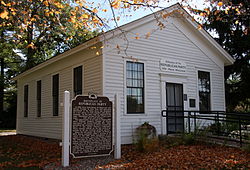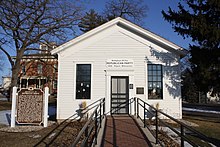Little White Schoolhouse
Little White Schoolhouse | |
 The Little White Schoolhouse in 2013 | |
 | |
| Location | 303 Blackburn Street, Ripon, Wisconsin |
|---|---|
| Coordinates | 43°50′38″N 88°50′11″W / 43.84389°N 88.83639°WCoordinates: 43°50′38″N 88°50′11″W / 43.84389°N 88.83639°W |
| Built | 1854 |
| NRHP reference No. | 73000079 |
| Significant dates | |
| Added to NRHP | August 14, 1973[1] |
| Designated NHL | May 30, 1974[2] |
The Republican Schoolhouse, also known as Little White Schoolhouse or Birthplace of the Republican Party, is a historic former schoolhouse at 305 Blackburn Street in Ripon, Wisconsin. Built in 1853, it was designated a National Historic Landmark for its role in the 1854 founding of the Republican Party.[2] It is now a local history museum.
History[]


Construction[]
The structure was built in its original location in 1853 as a school. It was championed as part of a wider education initiative by a New York transplant, Alvan Bovay.[3] Bovay used his position in founding the school to further involve himself in politics, becoming a founder of the Republican Party, which formed during a meeting at the schoolhouse.
The building is a single-story wood frame structure, with a gabled roof and clapboarded exterior. It has modest Greek Revival styling, with a single entrance framed by pilasters and an entablature with cornice. There are sash windows on either side of the entrance.[4]
Politics[]
In 1854, opposition grew to the proposed Kansas-Nebraska Bill. The bill was championed by the dominant Democratic Party, and the opposition was split among several smaller parties, including the Whig Party, the Free Soil Party, and some internal Democratic Party splintering. In Ripon, Bovay, who had gotten the schoolhouse built, led the opposition, and canvassed support among opposition members of all the local parties. He called a meeting on March 20. The Whig and Free Soil parties dissolved themselves in favor of forming a new, united party to be called "Republican," with some Democrats also defecting from their local party branch to join the new party. With publicity from the New York Tribune, word of the party spread, other local chapters and state-level parties started forming by July or earlier, and a national party was formed by 1856.[3]
Preservation[]
The town quickly outgrew the small building, and built a larger brick building to replace it. The old building was sold to Wisconsin governor George Peck, for use as a home. By the early twentieth century, it had fallen into disuse, and was in danger of being demolished. Due to its historical significance, effort was put into saving the building.
Local civic and historical organizations, considering its local and national historical significance, raised funds to save it. The building was refurbished, and moved to the campus of Ripon College. Later, it was moved twice more to other locations on campus.
Its fourth and final move, in 1951, was to its present location.
Twenty-two years later, it was recognized it as a historic site by the United States National Park Service, which declared it a National Historic Landmark in 1974.[2][4] From 2005 to 2007, the house underwent a renovation.
It was a one-room schoolhouse.
See also[]
- List of National Historic Landmarks in Wisconsin
- National Register of Historic Places listings in Fond du Lac County, Wisconsin
References[]
- ^ "National Register Information System". National Register of Historic Places. National Park Service. January 23, 2007.
- ^ a b c "Little White Schoolhouse". National Register of Historic Places Collection. National Park Service. Retrieved January 3, 2018.
- ^ a b "History". Little White Schoolhouse.
- ^ a b Levy, Benjamin (November 8, 1973). "National Register of Historic Places Inventory-Nomination: Little White Schoolhouse / "Birthplace of the Republican Party"" (pdf). National Park Service. Cite journal requires
|journal=(help) and Accompanying 3 photos, exterior, from 1972 and 1973. (1.05 MB)
External links[]
| Wikimedia Commons has media related to Little White Schoolhouse. |
- Official website
- Historic American Buildings Survey (HABS) No. WI-15, "Republican Schoolhouse, Second & Elm Streets, Ripon, Fond du Lac County, WI", 1 photo, 2 measured drawings, 3 data pages, supplemental material
- National Historic Landmarks in Wisconsin
- School buildings on the National Register of Historic Places in Wisconsin
- One-room schoolhouses in Wisconsin
- Historic American Buildings Survey in Wisconsin
- Defunct schools in Wisconsin
- Museums in Fond du Lac County, Wisconsin
- School buildings completed in 1853
- Schoolhouses in the United States
- Education museums in the United States
- History museums in Wisconsin
- Ripon, Wisconsin
- Relocated buildings and structures in Wisconsin
- National Register of Historic Places in Fond du Lac County, Wisconsin
- Republican Party (United States)
- Republican Party of Wisconsin

